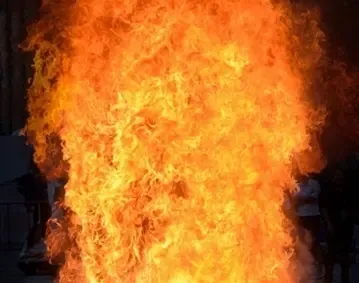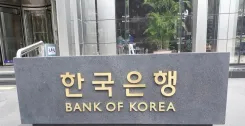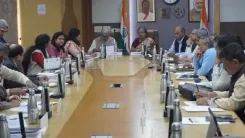Why Did Plastics Treaty Talks in Geneva End Without Consensus?

Synopsis
Key Takeaways
- Negotiations ended without consensus
- Over 2,600 participants engaged
- Future discussions to be scheduled
- Geopolitical and economic complexities impacted talks
- Urgent action against plastic pollution remains critical
Geneva, Aug 15 (NationPress) After an intensive 10-day negotiation period, the Intergovernmental Negotiating Committee (INC) discussions aimed at formulating an international legally binding instrument to combat plastic pollution—including in marine ecosystems—were brought to a close early Friday with no agreement on the text of the instrument. The committee has decided to reconvene for further discussions at a later date to be confirmed.
The conclusion of the meeting was marked by a strong willingness among member states to persist in the dialogue, despite recognizing the substantial divides in perspectives among them.
During this fifth session (INC-5.2), over 2,600 individuals gathered at the Palais des Nations in Geneva, comprising around 1,400 delegates from 183 countries and nearly 1,000 observers representing more than 400 organizations.
Additionally, about 70 ministers and vice-ministers, along with 30 other high-ranking officials, conducted informal roundtable discussions on the sidelines of the session.
“The past 10 days have been a challenging journey amid geopolitical complexities, economic hurdles, and multilateral tensions. However, it is evident that every nation is eager to stay engaged. Although we did not achieve the treaty text we aspired to, at UNEP, we will persist in our efforts against plastic pollution—contaminating our groundwater, soil, rivers, oceans, and even our bodies,” stated Inger Andersen, Executive Director of the UN Environment Programme (UNEP).
The ambition of INC-5.2 was to agree on the instrument's text and identify unresolved matters necessitating additional preparatory work before a diplomatic conference.
The session followed a systematic structure, beginning with an opening plenary, moving into four contact groups addressing critical topics such as plastic design, hazardous chemicals, production limits, financing, and compliance, followed by a stocktake plenary, informal consultations, and concluding with a closing plenary on August 15.
A Chair’s Text from INC-5.1 in Busan served as the negotiation foundation at INC-5.2, with the Chair unveiling a Draft Text Proposal and a Revised Text Proposal throughout the session.
Despite vigorous engagement, committee members could not reach a consensus on the proposed texts. “Not achieving the target we set may lead to disappointment or frustration. However, it should not dishearten us. Instead, it should motivate us to regain our vigor, renew our commitments, and align our aspirations,” remarked INC Chair Ambassador Luis Vayas Valdivieso.
“While a consensus has not yet emerged in Geneva, I am confident that the day will come when the global community unites to safeguard our environment and the health of our populations.”
This INC initiative commenced in March 2022 during the resumed fifth session of the UN Environment Assembly (UNEA-5.2), where a historic resolution was adopted to create an international legally binding instrument addressing plastic pollution, including in marine environments.
“As we conclude this session, we depart with a clearer understanding of the challenges ahead and a shared commitment to tackle them,” stated Jyoti Mathur-Filipp, Executive Secretary of the INC Secretariat.
“Now, advancing must be our responsibility.”
In response to the failure to achieve consensus, Indian public policy analyst Dharmesh Shah commented, “Progress has been hindered by a small group of nations whose insistence on consensus-only decision-making has empowered the least ambitious voices to obstruct measures favored by the majority—from production limits to regulations on toxic chemicals.
“This mindset has delayed urgent actions and weakened the treaty’s potential to protect health and human rights. Nations with the capability and influence to lead, including India, must choose: rise with ambition and assist in delivering a treaty that addresses the scale of the crisis, or risk being remembered for maintaining the status quo while the world calls for change.”
The session also witnessed the active involvement of civil society, including Indigenous peoples, waste pickers, artists, youth, and scientists, who expressed their views through protests, art displays, press briefings, and events at and around the Palais. The Geneva session follows INC 5.1, which occurred in November-December 2024 in Busan, South Korea.
Prior to this meeting, four sessions were held: INC-1 in Punta del Este in November 2022, INC-2 in Paris in June 2023, INC-3 in Nairobi in November 2023, and INC-4 in Ottawa in April 2024.









